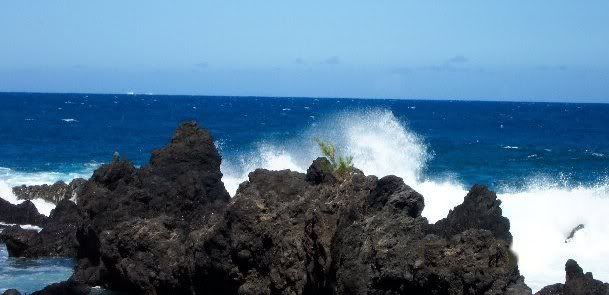May 11, 2007
Another World All Together

Old Original Slave Cabin
Magnolia Plantation Charleston South Carolina. The slave mentality and its resulting color line were barely veiled to my way of thinking there in the Charleston SC area... I was told when I asked about it that "things have improved a lot..." Perhaps, I didnt see outward signs of racism ie no signs that said "No Colored" anywhere but they are there in spirit I could feel it.
"Yeah Boss man, its a different world down there in the Deep South...I could see that there is still a long way to go with regards to equality..."
" Hoku, you drove around and saw what I lived around for years. No good jobs, and the few employers there are, are on the good ole boy system so outsiders and Blacks cant get a job... Like what you faced in Hawaii. People really have few chances to make their lives better and for the most part generations have been whollowing in poverty, and not just Black people."
I nod knowingly... both of our families have roots in the cotton fields of West Texas, and it wasnt too many generations ago that our ancestors lives were as hard scrabble as those folks living in makeshift houses and trailers there in the South Carolina Low Country. On another note...I can also see how those that lived like this in places like Slidel Mississippi, and other poor areas didnt have a icecubes chance in hell of surviving Katrina... The thought of a huricane going through the salt marshes and bayous of the Low Country made Woody and my skin crawl...
Its like another world there. In Hawaii I took it for granted the poverty that I saw was a result of the island culture, a more casual attitude of living that didnt allow for the standard of living that Woody and I were used to and were not willing to give up having. I have later come to understand that the poverty there is caused by many factors not the least of which is a poverty of spirit and what I call the "slave mentality" an attitude of waiting for and wanting a hand out from a paternalistic entity, in Hawaii once it was the Plantation Owners who promised work and support from adulthood till death. I think that the government has encouraged that among the poor in general and that has lead to the poverty of spirit that I saw a lot of as we drove through the counties between Charleston and Savannah.
There were churches, lots of them, of every type you can imagine. As we drove on sunday I saw that the parking areas were fill and at some places the cars and trucks were parked all down the streets, away from the building. And Id like to think that many of the people that we met reflected the spiritual feeding that they received there. Insted of the negative, even hostile attitudes that we have experienced when we have tried to engage many non whites in conversation in California, and even Hawaii, we found that people were interested in telling us about their lives. They shared about the difficulties of finding work, of affording to repair homes. Like Hawaii, the young leave to find better opportunites. We saw a lot of old folks out in the country and not a lot of young people.
Some if the areas looked as though a hurricane had gone through and no one could afford to fix the damage... Its benign neglect, and people were open about that. Even the resort showed that same feeling as the grounds were neat but the interiors looked like they really needed help. I know money is short there too as the place changed hands recently, but its also the punishing climate, damp and salty from the sea water being right up against you and around you...

The beautiful Ashley River. It and its sister river, the Cooper empty in Charleston harbor, this is about 5 miles upstream
But for all of the negatives, there were many positives too. There is a huge effort going on by local people to retain the local culture. A large number of African Americans, decendents of slaves owned by area land owners are taking personal ownership of oportunities to pass on their languange and culture, much of which came from Africa.
The Gullah people, brought from Sierra Leone to work the big rice plantations in the early 1700's, still use their own language and cutural practices. There are craft guilds that support the production and marketing of their handicrafts. After seeing the way the Hawaiians have saved and preserved their language and culture and how important that contribution that is, this is another unique culture that I enjoyed very much. It gives me hope that more good will come to these folks. they all seemed very grounded, and maybe its because of thoughts like this Gullah proverb that I heard more than once that week...
If oonuh ent kno weh oonuh dah gwine, oonuh should kno weh oonuh come f'um. Translation: If you don't know where you're going, you should know where you come fromI have certainly found strength in my own life from being rooted in a good place...

It doesnt get worse than this, we can all look back and see how far we have come, some more than most...Magnolia on the Ashley Plantation, near Charleston SC
Labels: Traveling
